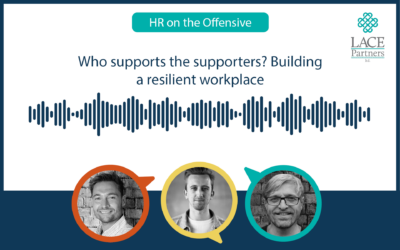In this week’s blog we hear from our CEO and Co-founder Aaron Alburey on the industry’s favourite non-buzzword. All signs point to many more years of HR and business transformation, but what does that really mean? Hear what Aaron has to say below.
At LACE we are of course immersed in the world of HR transformation; we live, sleep, eat and breathe it for our clients. In a post-pandemic world where everyone seems like they are talking about business transformation, it can be quite easy for the term to become so overly used that it loses the fundamental meaning, the ethos, of what it is all about. Have you ever said a word repeatedly so many times that it loses all meaning?
What are the actions a business can take to ensure they deliver on a successful transformation programme? Why should you care about this? Does a business ever stop transforming? In today’s blog we wanted to answer a few of these philosophical questions because, frankly, we’re often asked them ourselves when talking to businesses.
The importance of behavioural shift to enable transformational change
The most fundamental thing to consider in any complex change or business transformation is that it’s as much about the change as it is about the behaviours of people who are going through it. There’s an emotional connection to change that is vital to bear in mind to help people work in a different way – taking on a new habit, a new way of operating or working.
A steady statistic of 75% of all major transformation programmes fail to deliver on return on investment. Is this a case of a lack of adoption of the tech, for instance, or a lack of adoption of the business transformation overall? Simply put, if behaviours aren’t shifted, people will stick with the ways they’ve always worked. It’s essential, therefore, to get across to people why it’s going to make life easier, and how it will benefit them.
HR’s role in enabling transformational change
HR’s role is to unpack why people feel ready or not ready for change. There are several drivers such as organisational support and culture, access to leadership guidance and support which influence whether teams are keen to adopt the change. People will also have a personal view of risk and whether the change will make their job easier or puts their role at risk.
HR is in a unique position to understand the different groups of people involved and build a strategy to support change. Management can and should address issues by creating a culture of continuous and sustainable change, where people buy-in and adopt change. HR can play a very strong role helping to explain why the change is happening, why it’s important and supportive to the business and individuals.
How to begin your transformation journey
As a business that supports organisations with their digital transformation journeys, we often come across companies that see transformation through a technology lens. They see change that is happening in the world, and they want to focus on implementing new technology that will make their life easier, but they want to know how much effort it is going to take to get their people to adopt the new technology. Too many organisations get stuck on the perception that a digital transformation is some kind of large and expensive exercise that is going to cost millions and involve a lot of work. But ultimately with any kind of transformation you should ask yourself the questions:
- Is what we’re trying to do going to make people’s lives easier?
- How much effort is it going to take us to deliver?
- Do we have the people within our business ready to embrace the change of the new technology? Are they ready for the change?
The word ‘transformation’ seems to have connotations of some kind of large-scale event but sometimes answering the simple questions about your business is where you start and why you should avoid seeing the word ‘transformation’ as a buzzword, but rather as a trigger for asking the right questions about whether your business is ready for change, how that change will benefit your business, as well as what form that change should take.
What are your thoughts on transformation? Where is your business at in its change journey and would you like to talk to somebody about how you ready your people for change? Reach out to us using the form below.






